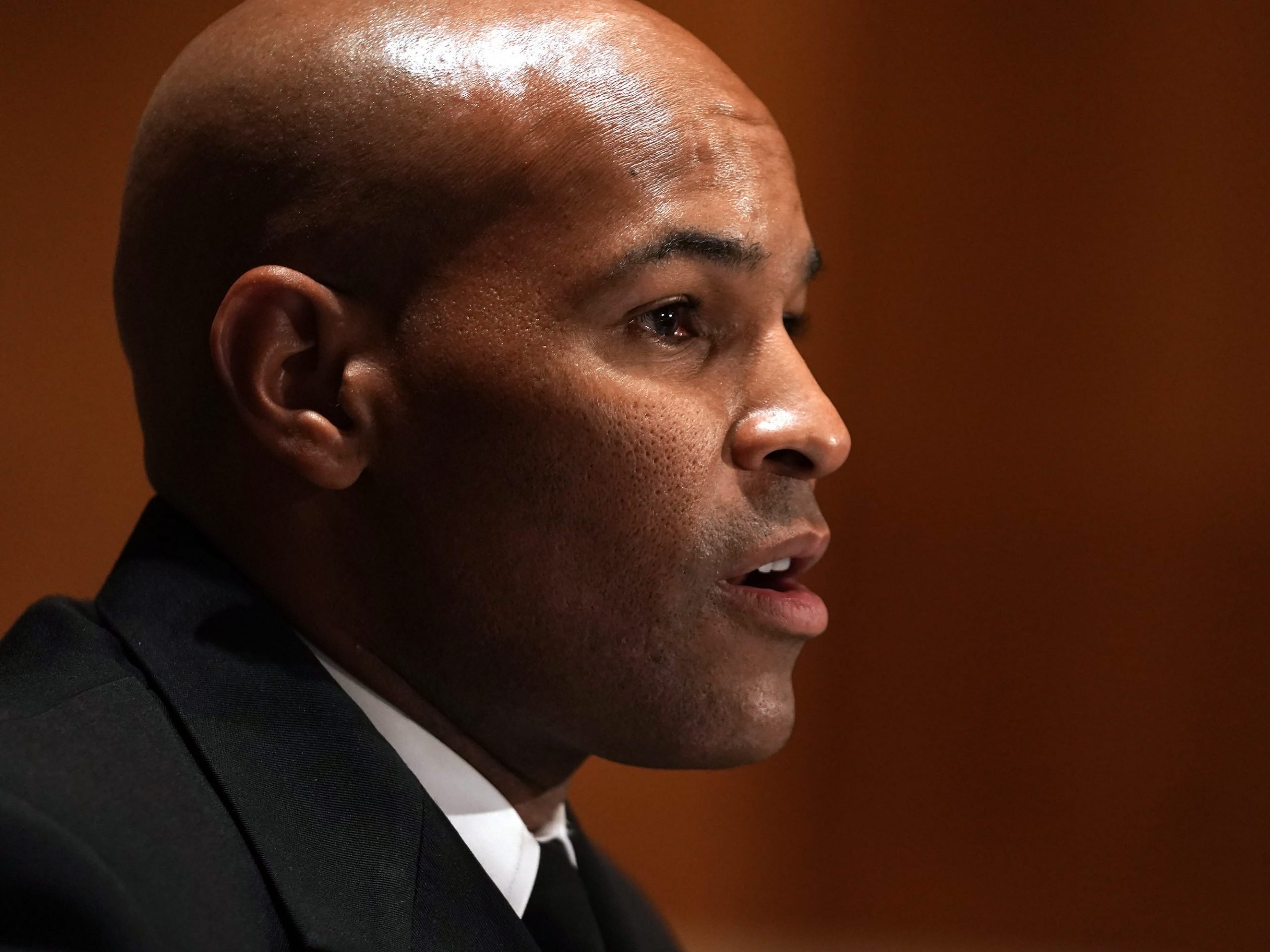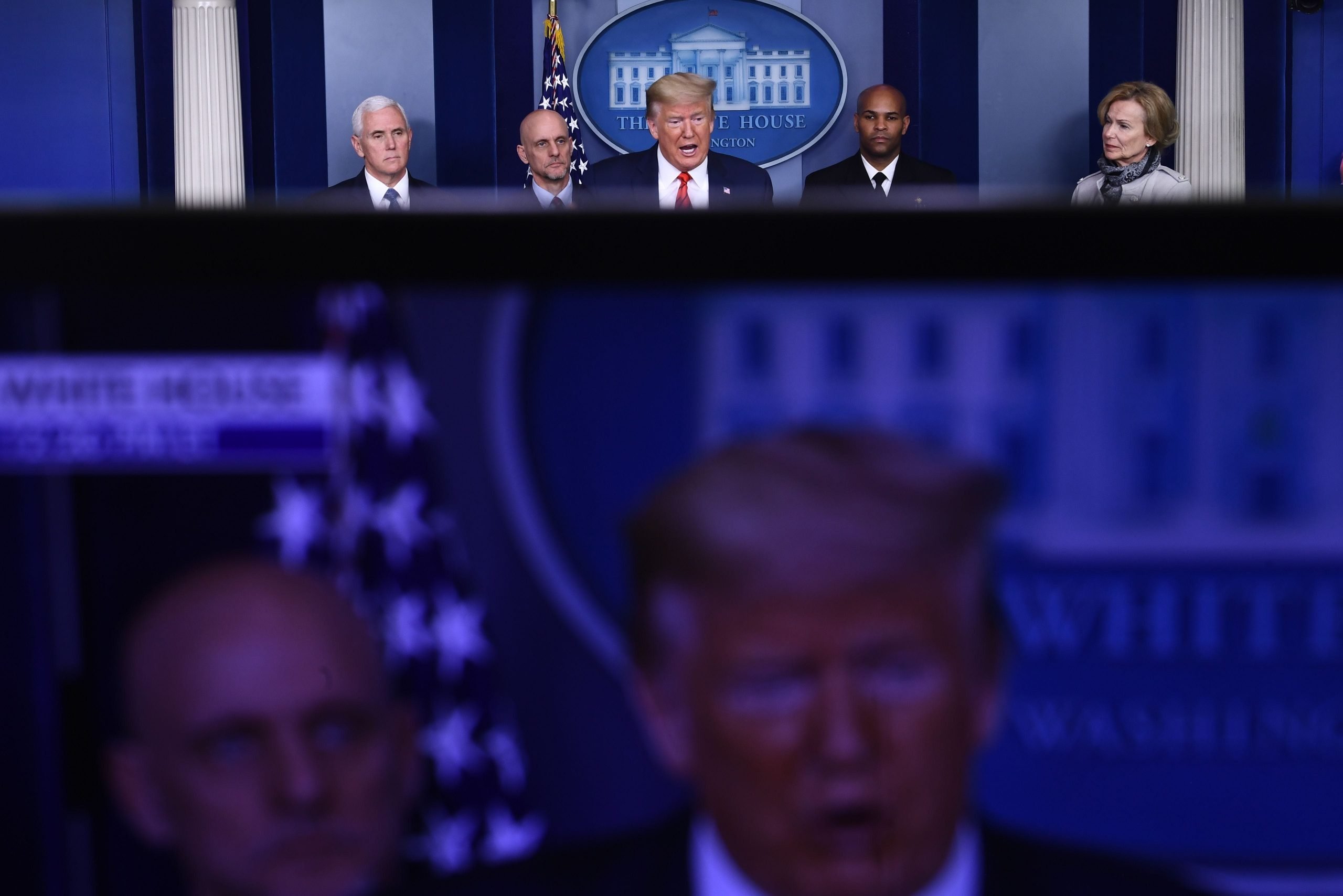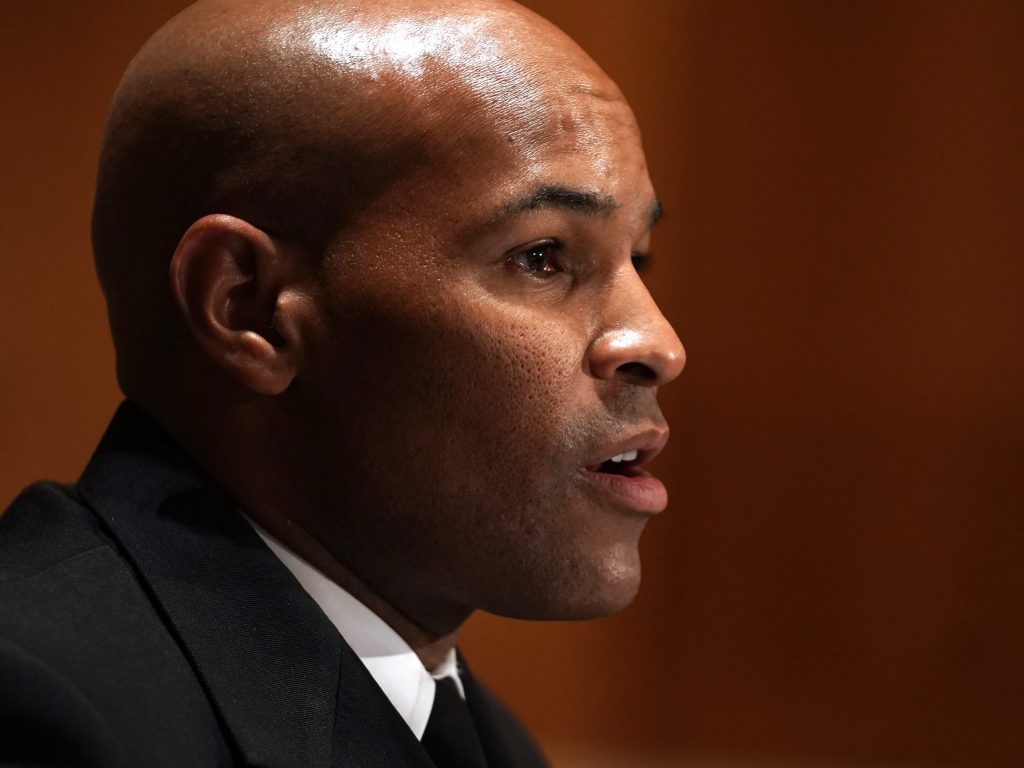
GREG NASH/POOL/AFP via Getty Images
- Dr. Jerome Adams, the former surgeon general, practices medicine in Indiana and continues to be outspoken about public health.
- Adams spoke to Insider informing the public, saying officials must be more transparent about when kids can get vaccinated.
- "They keep moving the goalposts on us [regarding vaccine authorization for kids] and that's further hurting confidence," he said.
- See more stories on Insider's business page.
Last year, Dr. Jerome Adams, the former surgeon general, became a familiar presence to millions of Americans as they watched then-President Donald Trump's briefings during the earliest weeks of the coronavirus pandemic.
Adams, a 46-year-old anesthesiologist who grew up in rural St. Mary's County, Md., and rose to become the Indiana State Health Commissioner before being tapped by Trump to serve as surgeon general in 2017, saw firsthand how communicating effectively with the public about COVID-19 was critical.
"I think that one of the lessons learned from the pandemic is that we absolutely need more communications professionals working with scientists to message the information that goes out there," he said. "I think it's important to appreciate the challenges and the mistakes that have been made in communication throughout the course of this pandemic."
Adams, who like most medical professionals learned about the evolving nature of the coronavirus in real time, has been candid about his regret in advising against masks earlier in the pandemic when there was less knowledge about the spread of the virus from asymptomatic carriers.
After leaving government in January, Adams now practices medicine in the Indianapolis area and has continued to be outspoken about public health issues, especially as it relates to the debate over school mask mandates.
"At some point, the virus forces our hand to move beyond politics and really deal with whether or not we want virtual school for the rest of the year or whether or not we want in-person school with masks," he said.
Adams recently spoke with Insider about his time as surgeon general and the ongoing fight against COVID-19.
Questions and answers have been edited for brevity.
Insider's John L. Dorman: Right now, the US still has a significant number of people who have chosen not to get vaccinated (53% of the total population, equaling 176 million people, are fully vaccinated as of Sept. 6). What additional measures can the government employ to fight vaccine hesitancy?
Jerome Adams: Recently, I think they have done a very good job of pushing back against misinformation. I've been saying for quite a while that there needs to be a concerted effort to push back against some of the misinformation out there, particularly on social media.
I do think that they need to be a lot more transparent about what's going on with the [Food and Drug Administration]. The largest group of people who are unvaccinated in many communities right now remains people who are under 12. Right now, they keep moving the goalposts on us [regarding vaccine authorization for kids] and that's further hurting confidence because there doesn't seem to be transparency about what's taking so long.
They could also find and lift up representatives from the communities that are the most hesitant. So for instance, I can't name one prominent Republican who the Biden administration has embraced and said, "Hey we want you out there speaking about vaccines." They rarely have a Black or Hispanic or Native American doctor out there speaking at their press conferences, and I think that's a real deficit in their response.
JD: You were part of the White House coronavirus task force and played a public role in the national response when there was so much uncertainty. What were those initial weeks like?
Adams: I was the [Indiana] health commissioner during the Ebola outbreak. I knew what it would be like to be in this situation, and it was all the more frustrating to not have had a more coordinated media and communications strategy to the public after we saw what happened with Ebola.
In February and March of 2020, I was talking with the NAACP and the National Medical Association in trying to raise the alarm that COVID-19 was going to disproportionately hit Black and brown people. I worked with groups to tell them that the virus would affect people in poor health and among lower socioeconomic groups particularly hard.

BRENDAN SMIALOWSKI/AFP via Getty Images
JD: How did you feel like your message was received?
Adams: It was heartbreaking, quite frankly, to see it play out the way that it did, because you know, from a scientific point of view, I saw it coming. It was frustrating because in many cases, the pitch was not heard the way I wanted it to be heard, because people only saw the guy standing next to President Trump.
They didn't see the Black man who fought and overcame so many challenges just to become a doctor after growing up poor and in a rural area. They didn't see the person who spent his entire career really fighting for health equity. They saw "Trump's Surgeon General" and that caused people to discount, dismiss, or just distrust anything that I said in that space. It seemed like no matter what I did, it was received in a politically charged way and not in a way that I intended or hoped.
JD: In May, the Centers for Disease Control announced that fully vaccinated people could forgo masks in most situations. However, just weeks later, with the rise of the Delta variant, masks were once again recommended in areas of high-transmission. Do you feel like the earlier mask guidance was premature?
Adams: I defended the science behind their decision at the time because it was based on the Alpha variant. I still think it was premature and rolled out in a way that didn't allow for messaging to help the public understand that ... "Hey, this is what we believe to be true right now, but it could change."
I certainly feel in hindsight, it was a turning point in this epidemic. It really came across to me and a lot of others that the current administration said "We defeated COVID" and it's time to move on. And the country moved on. I think in many ways they created a lot of this pushback that now we're having to deal with ... with people pushing back against masking, because they're thinking ... "Hey, you told us that if we just got vaccinated, no more masks."
The science at the time can say that something is true, but even so, it can still be the wrong decision to make in terms of messaging and politics.

JIM WATSON/AFP via Getty Images
JD: School mask mandates have become a polarizing issue, with legal challenges popping up across the country. What do you see as a resolution?
Adams: Lawsuits over mask mandates will ultimately revolve around who has the authority to protect individuals. Is it the local school officials or the governor? You're going to actually start to see some civil lawsuits from people who are endangered by some of these decisions that clearly go against science, especially if someone ends up in the hospital or dies after getting exposed. Ultimately, that's what's going to help decide this. I think the other thing is that the virus ultimately determines what's going to happen.
What we're seeing right now is that all these debates happened. And then guess what? Communities became overwhelmed and schools have started to shut down. If half of your class is out in quarantine or your teacher is out isolating because they caught COVID-19 from someone at school, then you functionally cannot stay open no matter what the governor or local officials say.
JD: Some virologists have said that it remains unclear if booster shots are needed by a large swath of the population, especially as the two-shot Pfizer-BioNTech and Moderna vaccines are still highly effective at preventing hospitalization and death, even if the protection wanes over time. What are your thoughts?
Adams: The main advantage of these vaccines is that they help prevent severe disease and hospitalization. These vaccines still work incredibly well for that purpose. What the CDC and FDA are saying is that we're seeing decreased immunity and a decreased ability to prevent mild disease in people infected with the Delta variant. That is true. That said, there are a lot of doctors out there, myself included, who think that we need to be more focused on preventing severe disease and hospitalization in people who've not received one vaccine dose versus preventing mild disease in people who've already got two doses of the vaccine.
The [World Health Organization] has said that it is actually immoral from their standpoint for Americans to be getting a third vaccine when the rest of the world is still waiting on their vaccine. So there is a science part to this, and then there's a morality/ethics/political part. The science part to this is, "Hey, in a perfect world, if we see the effectiveness of vaccines at preventing even mild disease, then we should be talking about offering boosters." But in an imperfect world, you have to ask yourself, "Where do you get the most bang for your buck from that vaccine dose?"
I think it's inarguable that you're going to get more bang for your buck by giving shots to a 10-year-old who has not been vaccinated or someone in Africa or India who had no vaccine immunity over giving a third dose to someone in the US who's still got pretty darn good protection from hospitalization and death.
